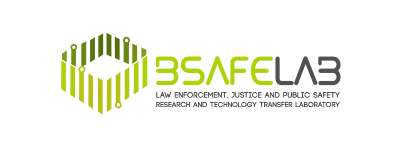BSAFE Lab
Law Enforcement, Justice and Public Safety lab is an open interdisciplinary research and technology transfer laboratory
Founded as a result of the collaboration between IPS_Innovative Prison Systems and UBI – University of Beira Interior (Portugal), BSAFE LAB is an open interdisciplinary research and technology transfer laboratory aiming to foster and develop new research and technology transfer in the fields of law enforcement, justice and public safety.
Research areas
Law Enforcement, Justice, Public Safety
Location
Covilhã, Portugal

A dedicated laboratory for collaborative research and technology transfer
This dedicated laboratory objectives consist in fostering the advancement of scientific knowledge, the effectiveness of public and civil society agencies and the empowerment of small and medium-sized enterprises (SME) competitiveness through:
- The development of new research projects (involving public organizations, private sector, and government agencies);
- The technical supervision of masters and PhD thesis;
- The implementation of innovation demonstration actions (technology transfer pilots and experimentation playgrounds) involving SME’s and public sector agencies;
- The establishment of partnerships with research and government institutions worldwide;
- Providing technical assistance to third parties (companies and government agencies);
- Customized training courses.
Fostering the advancement of scientific knowledge
BSAFE LAB has scientific independence and operates according to its specific rules and a triennial strategic plan, approved by its members. Its governance bodies consist of an executive board, a strategic advisory board, a scientific commission and a scientific board.
Amongst others, BSAFE LAB is focused on the following research areas:

- Public-private partnerships in justice;
- Penitentiary, prisons, and probation;
- Prison planning, architecture, and engineering;
- Prison management;
- Education and reinsertion;
- Risk assessment (offenders and ex-offenders);
- Community sentences;
- Relation between inmates, family, and community;
- Prison work and industries;
- Relation with employers;
- Health and e-health in detention institutions;
- Mental illness in prisons;
- Suicide prevention;
- Electronic monitoring;
- Learning technologies for inmates;
- Prison staff training;
- ICT for prisons and probation (digital communication, sensors, robotics, drones, internet of things, cloud computing, learning technologies, e-health, wearable and mobile devices, gamification, non-cooperative biometric recognition, etc).
